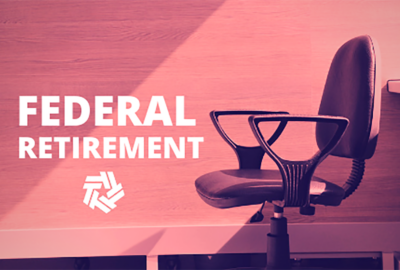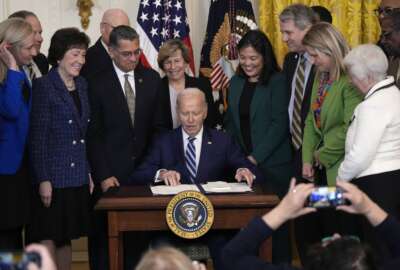It’s never too early to make sure your life’s paperwork is in order
Too often, federal employees don't spend enough effort on the legal documents needed to protect a modern estate.
Shrewd federal employees spend a lot of time ensuring they’ll have enough money to retire — and maybe leave some behind. Too often, though, they don’t spend enough effort on the legal documents needed to protect a modern estate. Joining the Federal Drive with Tom Temin with a few important reminders is wealth advisor Thiago Glieger.
Interview transcript:
Eric White Shrewd federal employees spend a lot of time ensuring they’ll have enough money to retire and maybe leave some behind. Too often, though, they don’t spend enough effort on the legal documents needed to protect a modern estate. Joining Federal Drive host Tom teman earlier with a few important reminders, wealth advisor Thiago Glieger.
Tom Temin Let’s start with the idea of trusts and wills. That gets pretty arcane pretty quickly. But without those things, you go to probate when you die, and then anything can happen.
Thiago Glieger That’s right. I think people often think that trusts are for the ultra wealthy, and it’s true that a lot of wealthy families use it to protect against the state taxes and things like that, but control is the name of the game. If you are, if you have assets that are going to probate, you’re going to have to have an attorney that’s helping you deal with that. There’s often a CPA. The more assets that are in probate, the more timely the process can be. Plus, probate is a very public process, right? So if there’s anyone in the family that could want to contest some of the inheritance, they can very easily do that. That’s the whole idea of the probate process. So keeping things in trust, even a very simple trust, helps you to pass assets on in a way that’s much easier.
Tom Temin So what exactly is a trust, and what does it do?
Thiago Glieger A trust is technically a legal document that you create, and you can set all sorts of rules, particularly for when you are passing on legacy. Now there’s so many different kinds of trust. There are trust for when you are alive, there are trust for when you are dead. There are trusts that you have control over. There are trust that you give up control. And so you want to work with the qualified estate and tax professional to be able to get the right trust for you in place, but essentially, it’s a document that outlines what is going to happen with the money in certain circumstances.
Tom Temin And so a trust sounds like an ongoing living thing, but it’s actually a fixed legal document.
Thiago Glieger It can be both. In some cases, it’s a one and done where you create a document, and those are typically called irrevocable trusts, where you create a document, you fund the irrevocable trust with money that now you’re essentially no longer owning that money. It’s out of your control. That’s kind of a fixed thing for the most part. But most people use simpler trusts that are living trusts, and they do make changes through it over time. So as grandchildren come into their lives, they may carve out a portion of their trust to say, hey, I would like a part of my legacy to be used for their educational expenses in the future. And this allows them to have a little bit of control, even maybe beyond the grave, or pass on stewardship values. There are a lot of families that say, hey, I don’t like my assets to be used in this manner. I want them to be used in this way. Instead, those are all things that can be accomplished through the use of a trust.
Tom Temin And you have to have someone administer the trust after you’re gone, correct? Because the person whom you might give power of attorney to while you’re alive, and say, you know, sometimes people with dementia, or whatever, or that you might have your children become your powers of attorney. The power of attorney ends when you cross the bridge.
Thiago Glieger That’s right, yeah, that’s right. And the title of the person who administers the trust upon your death, or even some cases, even when you’re alive, the name of that is the trustee, and most often, for simpler trusts, you can be the creator of the trust, and you can also be the trustee, so you’re managing the trust for your life, and people will create a successor trustee so that when they pass, somebody else can step in. There’s pros and cons to having this as a family member. I will tell you that in some cases, there can be contention when there is money involved, right? And the family is now administering the trust. So often, people will look to professional trustees, which usually is an attorney, a fiduciary, who comes in, and their job is to read your trust and administer it in a way that would have been meaningful to you, and of course, following what the document says.
Tom Temin And what’s the difference between a trustee and an executor?
Thiago Glieger A trustee is going to be somebody who’s responsible for effectuating the trust documents and the different activities that need to happen within the trust. An executor is going to be somebody that’s managing the estate, right? And so anything that isn’t in trust is going to be part of your estate. So it can get a little complicated, but the idea is, if you’re putting assets into trust, hopefully that gets to avoid probate and stay out of your estate. So things like a car, for example, those are things that will go to probate. They are in your estate, but an executor, often called a personal representative of your estate, they can very easily retitle a car to a beneficiary. If something is in a trust, the trustee is the one that’s responsible for taking the trust assets and doing whatever you would have wanted to.
Tom Temin We’re speaking with Thiago Glieger. He’s a wealth advisor with RMG advisors of Rockville, Maryland. Does the trustee then report, so to speak, to the executor? Do they work side by side? I can see where, you know, some clashes could occur.
Thiago Glieger They often work side by side. Sometimes it is the same person, especially if it’s a very simple trust in a very simple estate. In the cases where there is a professional trustee, where they’re actually using a firm for this, then that person usually works with the executor. The executor, the personal representative, is most often a family member, because that person is really just dealing with administrative tasks of closing out the estate, making sure the taxes get filed with the accountant, things like that. The trustee is the one that’s actually distributing the assets out of the trust. So sometimes there can be contention, if again, especially those are two family members who maybe disagree with one another, don’t have good relationships. Things like that are all things to think about.
Eric White Thiago Glieger is a wealth advisor with RMG Advisors of Rockville, Maryland. We’ll post this interview at federalnewsnetwork.com/federaldrive. Hear the Federal Drive on demand. Subscribe wherever you get your podcasts.
Copyright © 2025 Federal News Network. All rights reserved. This website is not intended for users located within the European Economic Area.
Tom Temin is host of the Federal Drive and has been providing insight on federal technology and management issues for more than 30 years.
Follow @tteminWFED






